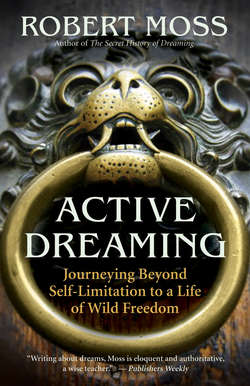Читать книгу Active Dreaming - Robert Moss A. - Страница 21
На сайте Литреса книга снята с продажи.
The Office of Lost and Found Dreams
ОглавлениеWhat happens to the dreams we don’t remember?
I’ve asked myself that question on several mornings when I’ve awoken with little or no dream recall while feeling that the night had been active.
On one such morning, I decided to linger in bed and see whether I could find a place where I could recover lost dreams. I found myself approaching an old-time cinema that reminded me of a movie theater where I used to go as a boy to watch Saturday matinees. I was amazed and delighted to find that, this time, the movie titles on the marquee and the images on the posters in the lobby all throbbed with significance in my present life.
Waking the Sleeping King was blazoned in lights.
One of the posters showed a boy riding a monster of the deep through a stormy ocean. Another depicted a steamy romance. The girl at the ticket kiosk smiled and gestured for me to go through. Soon I was settled in a comfy, padded velvet seat in a private screening room. As dream images filled the screen, I realized I had a choice. I could remain a comfortable observer, or I could enter the fray.
On another morning, after coffee, I decided to try the same method again. This time, instead of going back to the movie house, I found myself drawn to the kind of video store that is almost defunct, thanks to our new instant-delivery systems. This video store was vast, with its products arranged on many levels, On the first floor, dreams were arranged like DVDs on shelves according to familiar categories — drama, comedy, family, and so on. There was a large adult section, most of whose content was unfamiliar to me. I realized that a block had been placed on some of this material so that it did not reach my conscious mind, or — in cases where the film had been rated I (for intrusion) — had not been allowed through during the night.
I discovered sections devoted to my dreams of individual people. I had only to focus on a name or title, and the movie began to play all around me, so I could enter it at will.
On a lower level of the dream video store, I discovered that I could explore dream adventures I may have shared with other people but had not remembered. I found an immense archive of shared dreams involving each of these people. One archive was as large as a Gothic cathedral, with shelves rising to the high ceiling many stories above. I watched several dream movies in each location. They took me deeply and vividly into scenes of other lives and other times — of leopard people in Africa, of Celtic voyagers in a coracle on a cold northern sea, of a turning castle in a high desert landscape where everything was the color of sand except for the pretty star-shaped flowers, blue and purple, on a terrace. The dream movies revealed a hidden order of connection in all these relationships that transcended our present lives.
On yet another day, when I felt impelled to go searching for lost dreams, I was drawn to a building that looked like an old-fashioned post office. It resembled the post office in the Rust Belt city of Troy, New York, where I once lived. When I arrived in front of it, in my conscious dream, the sky turned dark. I mounted the high steps and walked past the mailboxes toward the counters. Most of the steel shutters were down and locked for the night, but one was still half-open. Behind it, I saw letters spilling from pigeonholes and heaps of giant mailbags and packages. A small black woman in a blue uniform hurried to the desk and handed me a letter. I was moved to tears when I opened it and found a message from a beloved family member, long deceased.
When I turned to thank the postal clerk, I realized that I knew her. I had glimpsed her, in half-forgotten dreams, slipping mail through a letter drop in the door of my house, a letter drop that is not in the physical door. She strongly resembles a figure from history I was called to study by dreams I did remember — Harriet Tubman, a world-class dreamer who used her visions as maps to guide escaping slaves to freedom on the Underground Railroad before the American Civil War.
I suspect there are back rooms in my dream post office where there is more to discover. Maybe one of them is like the cabinet noir in the old French post offices, where mail judged suspect by the authorities was held for inspection and often was never delivered to the addressee.
If you are missing your dreams (and your dreams are missing you), try taking a little quiet time, when you won’t be disturbed, and announce this as your intention: “I would like to go to a place where I can find my lost dreams.”
Maybe this will take you to a movie theater, a video store, or a post office, or another place entirely, constructed from your own life memories and suited to your imagination. Whatever form it takes, you will be entering the Office of Lost and Found Dreams.
